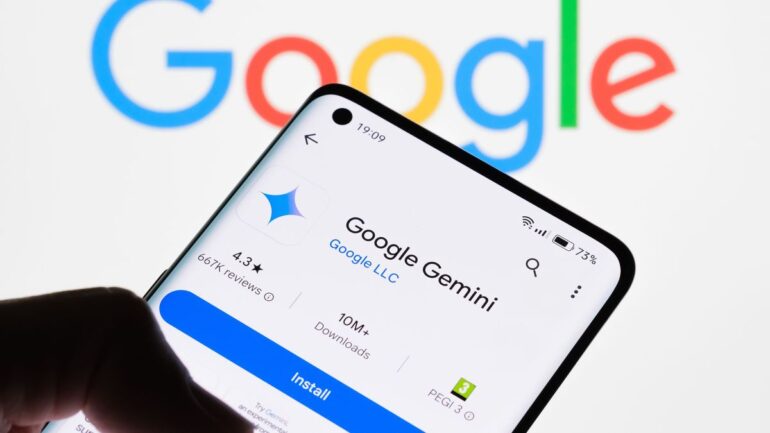Google Bets on Gemini as the Ultimate Assistant—But Can It Really Think Like a Human?

Google’s betting big on Gemini to become the ultimate AI assistant, promising human-like thinking and world-changing potential. But with experts warning that AI still lacks true reasoning and adaptability, is this a bold leap toward Artificial General Intelligence (AGI)—or a risky overpromise? Dive into the debate!
Google is working to extend its best multimodal foundation model, Gemini 2.5 Pro, which it claims will become a “world model” that can make plans and imagine new experiences by understanding and simulating aspects of the world, similar to the human brain. The search giant wants to “double down on the breadth and depth of our fundamental research, working to invent the next big breakthroughs necessary for artificial general intelligence (AGI).” However, a cautionary note comes from the 2024 Standford AI Index Report which points out that; “no current AI system exhibits general intelligence; even the most advanced models fail at tasks requiring abstract reasoning and real-world adaptability…LLMs still struggle with causal inference and long-horizon planning, key components of AGI.”
Google’s confidence stems from its impressive track record over the last decade when they company laid the fundamentals of the modern AI era from itsground-breakingTransformer architecture on which all large language models are based, to developing agent systems that can learn and plan like AlphaGo and AlphaZero.
LLMs lack deep understanding
In various interviews and statements, Yann LeCun, a pioneer in AI and Meta’s Chief AI Scientist, expresses a contrarian view of current LLMs, suggesting that they are nearing obsolescence. He advocates for a shift towards more fundamental approaches, like JEPA(Joint Embedding Predictive Architecture) and world models, which he believes are crucial for achieving true artificial general intelligence (AGI). LeCun argues that LLMs, while impressive, lack a deep understanding of the physical world and are limited to predicting the next word in a sequence.
LeCun’s JEPA Model aims to improve artificial intelligence by integrating different types of data, like text and images, to better understand their relationships. Instead of just predicting the next word in a sentence like traditional language models, JEPA focuses on predicting missing parts of data, which helps it learn more meaningful representations. It uses techniques that distinguish between similar and different examples to build robust features. By combining various data sources, JEPA aspires to create AI systems that have a deeper understanding of the world, which is seen as a crucial step toward achieving true artificial general intelligence (AGI).
Google’s Universal AI Assistant
Google, nevertheless is confident that it is already seeing evidence of AGI capabilities emerging in Gemini’s ability to use world knowledge and reasoning to represent and simulate natural environments, Veo’s deep understanding of intuitive physics, and the way Gemini Robotics teaches robots to grasp, follow instructions and adjust on thefly.Making Gemini a world model, according to the search behemoth, is a critical step in developing a new, more general and more useful kind of AI — a universal AI assistant. This is an AI that’s intelligent, understands the context you are in, and that can plan, and take action on your behalf, across any device.
Machines are Way Behind in Cognitive Flexibility
A cautionary note comes Gary Marcusan American psychologist, cognitive scientist, and author, known for his research on the intersection of cognitive psychology, neuroscience, and AI, who puts it across emphatically that; “machines are actually already light years ahead of humans on some variables (like computing floating point arithmetic), yet way behind on others (like cognitive flexibility and long-term planning in unusual situations).”
He goes on to say that,“really, machines themselves have a kind of cognitive diversity, each algorithm has its own strengths and weaknesses, LLMs are great at some kinds of pattern matching, but lousy at floating point arithmetic. Calculators are great at floating point math, but generally don’t do much pattern matching at all. The secret to making AGI almost certainly rests on getting disparate algorithms (e.g., those that work well with symbolic knowledge, those that can induce regularities from massive amounts of unstructured data, etc) to work together well.”
The company’s ultimate vision is to transform the Gemini app into a universal AI assistant that will perform everyday tasks for us, take care of our mundane admin and surface delightful new recommendations — making humans more productive.Over the past year, they have been integrating capabilities like these into Gemini Live for more people to experience today. For example, they have upgraded voice output to be more natural with native audio, we’ve improved memory and added computer control. Their roadmap is tobuild an AI that’s more personal, proactive, and powerful, enriching lives, advancing the “pace of scientific progress and ushering in a new golden age of discovery and wonder.”
In Favor of Keeping Humans in the Loop
But researchers at MIT are apprehensive about opaque AI systems that obscure their decision-making processes behind layers of proprietary technology, making it impossible to guarantee safety. Itmust be recognized that the most important feature of any technology isn’t increasing efficiency but fostering human well-being. An MIT Technology Review opinion piece titled, “Why handing over total control to AI agents would be a huge mistake”makes a potent argument in favor of human judgment, with all its imperfections, to remain as the essential component in ensuring that these systems serve rather than subvert our interests.


